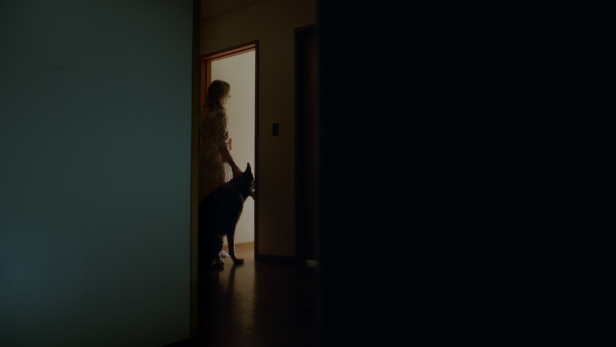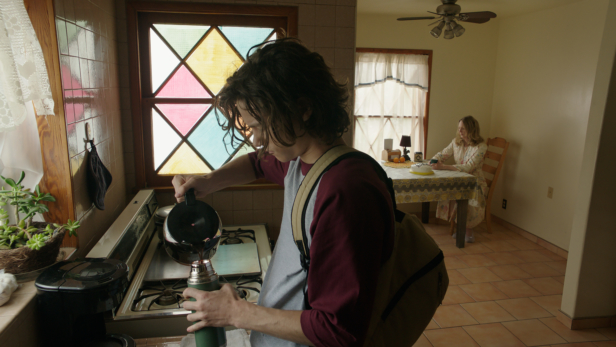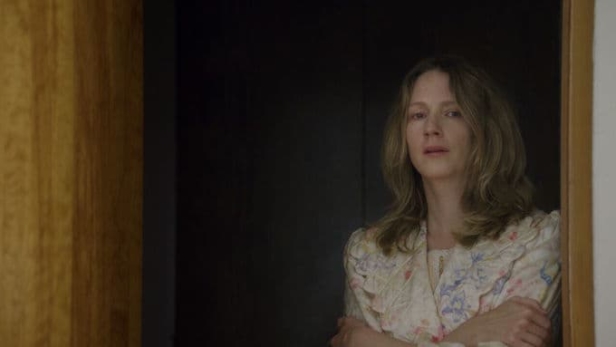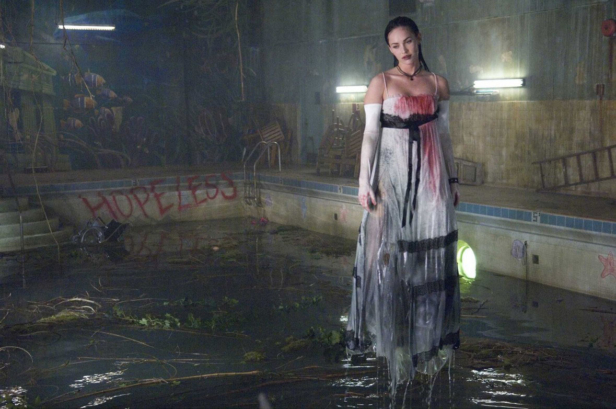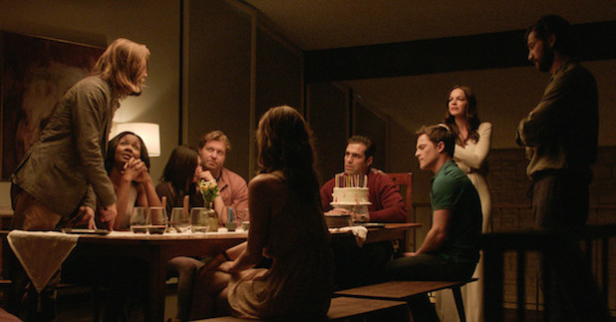Karyn Kusama’s brilliantly tense The Invitation is one of our favourite horror films of recent years, so we were very excited to hear that she would be a part of all-female horror anthology movie XX alongside Jovanka Vuckovic, Roxanne Benjamin, Annie Clark and Sofia Carrillo.
This isn’t the genre that Kusama started in (she made a splash with 2000’s excellent boxing indie Girlfight) but it’s one she seems to be flourishing in. Jennifer’s Body may have been woefully mis-marketed back in 2009 but it’s a hugely underrated and very sharp horror comedy that gets better with each passing year and, as we mentioned, The Invitation is just superb.
In XX, Kusama offers ‘Her Only Living Son’, a riff on Rosemary’s Baby that finds a mother on the run terrified of what will happen on her son’s imminent 18th birthday. The story works as spin on a classic horror tale as well as offering some sharp social commentary and reversals of genre tropes. We talked to the director about her inspirations for the film, why horror makes sense right now, how she feels looking back on Jennifer’s Body, and what we can look forward to in her upcoming film of Chase Novak’s Breed.
XX has been in development for a while. How did you get involved?
So Todd Brown is one of the producers and he’s also one of the founders of XYZ, which is a company I worked with to make The Invitation. There are now some great women who work there but when I worked there initially it was just a bunch of really great young guys who had some really interesting outlooks on life and were pretty progressive, it would appear, in their politics. They mentioned this idea that they wanted to address the scarcity of women in film, women in horror and women being represented in these anthology series, many of which they had found themselves involved with in some way or another and they said “Why don’t we do a female-driven anthology and the directors need to be women and the stories need to be about women.”
I just thought that was an interesting experiment and I signed on pretty early. It took quite a while for the final line-up of filmmakers to be established and the films to be ready, just given everybody’s schedules, but I was attached for a while and I found a month where I could prep and shoot and cut pretty quickly. So it was all ultimately pretty fast but slow-brewing to get to get to that point.
Was your story ‘Her Only Living Son’ something you’d been thinking about for a while?
Yeah, obviously it’s making what I hope it is interpreted as a loving and respectful nod to Rosemary’s Baby, and for me that film is so important on so many levels to me and for so many reasons, but something that I’ve always found to be a mysterious departure point for the film is when Rosemary Woodhouse seeks help from Charles Grodin, her original doctor. And he, as the younger, potentially more hip and progressive doctor, listens to her story about living among a coven of witches who have designs on her baby, and he listens patiently and he has a moment of seeming to believe her. I’m always so struck by that moment. Of course he doesn’t believe her and he returns her to her captors, I’m sure thinking that he’s doing the right thing.
I’m so interested by that moment because it feels like there was this tremendous narrative possibility that needed to be closed down but I wanted to open up, which was the idea that she was believed in her desperate bid for escape and help. That interested me, because what it comes down to is she still has to deal with the consequences of her child’s conception and of her past, and she still has to deal with the reality of the situation at some point.
I found it interesting to imagine that she might have this hard-scrabble 18 years getting her life on track and keeping her kid safe and anonymous and that there was another possibility for a story there that, to me, touched on ideas about watching your children turn into young men and women and facing the spectre of addiction issues and mental illness issues and behavioural issues that were out of your control. Somehow that felt like I could play around a little bit with those themes within this story.
There’s also that element of male violence, how most of the characters in the story are encouraging his monstrousness…
Well that’s the question I wanted to explore too, beyond the more arch and theatrical idea, which I actually don’t mind, I sometimes like going into arch or theatrical territory but I also like the feeling it could evoke around this idea of permissiveness around male violence.
That, for instance, even if there weren’t straight up devil worshippers, we clearly live in a society that has a hard time punishing a certain kind of man for his violence and for his transgressions against humanity, and I felt like “Oh that’s kind of an interesting thing to be exploring given that it’s like a ceaseless current.”
I kind of hesitate to talk about it anymore as a trend, I think it’s just the…it’s the way it’s been for millennia and I’m hopeful that things can change over time but the notion of male violence being the final word of the day feels, at this point, sadly quite a banal fact. I wish it weren’t true.
You’ve become associated with horror, has your work in this genre been by design or is it just how it’s worked out?
I feel it has been fairly accidental. Certainly, given the number of scripts that I get that are strictly horror now I can’t say that I would have ever planned for this, and I can’t say that I’ve been welcoming the idea that that’s all I can do or that that’s all I’m interested in because honestly the other day I was watching Moneyball and I was like “Why can’t I make a movie like that?”
So I’m very open to stories of all kinds, but I do think that with horror there is an opportunity for a kind of opera that a lot of other films right now are sort of prevented from expressing, this kind of operatic emotion, or I want to say…true cinematic expression. I just feel that there’s an expectation of confinement in some of the other genres and my sense is horror allows for experimentation that I don’t always feel I can exercise in other kinds of stories. That being said, some of the worst and most venal of our contemporary films end up being really crappy horror films!
I think what I’m attracted to about horror is that kind of high-low culture tension. This idea that it’s kind of a degraded form, and yet when a horror film works, I feel like very few things stay with me as profoundly. That’s the interesting tension that one gets to play with with the horror genre.
It feels like we’re seeing horror being recognised as a genre which can make these political and social points, like Get Out…
Well, also I feel like personally for me living in the US, I just feel like horror is where we’re at right now! Every day is a new kind of challenge to any sense of order or introspection or civilised behaviour. And the horror isn’t that it’s just regular people exercising their barbarism, the horror is that it’s often our leaders exercising that barbarism.
That is so itself a fairy-tale upside down world, I’m wondering if horror feels like the only place to express the disorientation that we’re experiencing right now. All of Europe, all of England, I sympathise with us all.
You made Jennifer’s Body back in 2009. Does it feel like things have improved for women working in the horror genre since that time?
I’ve been asked to think about this idea of women in horror and whether or not there are opportunities have changed or the attention given to them have changed, and I think it’s kind of a two-fold phenomenon. Which is one: a lot of really good films have just happened to emerged in the past three, four years from women in the horror genre and I think quite a few of them have a very interesting take on a female consciousness or female character or female problem. And the films are so hard to argue with their quality whether or not you love them or hate them, Raw and The Babadook and A Girl Walks Home Alone At Night and Evolution, these are all interesting films. No matter where you stand in your top 10, and some of them do, I just feel like they’re all really purposeful films.
And I wonder if that, combined with an openness to the idea of making films around female experience and female sensibilities, it’s just sort of those two things are twining, which I hope remains a trend. I think it’s difficult for me because I feel like I see changes and then I read the endless reports that come out every six months about the hard numbers in film and TV in front of the camera, behind the camera, in positions of leadership, and they remain so dismal that it’s tough for me to say “Oh yeah, it’s actually changing.” I remain flummoxed by the situation.
Jennifer’s Body does seem to be finally getting reappraised and rightly so! How do you feel about that film now?
I’m happy to know that people are taking another look at the movie. I honestly felt when I was making it that it was just a movie I would want to see when I was younger. I love the movie and I enjoyed making it so much but I felt like it spoke to the teenager in me or the young adult in me that felt, things like your best friendship was a life and death matter. Just baseline! So that kind of emotional intensity, it felt like that’s the kind of story that I would love to see as a younger person, having watched so many teen movies as a kid and feeling really like movies like Valley Girl and Fast Times kind of gave me a sense that I had the ability to be a filmmaker because those films just miraculously happened to be directed by women.
To watch those kinds of teen movies and then hit college and see things like Blue Velvet, Heathers and American Werewolf, films that had edge and wit and I think that’s what I wanted to do with Jennifer’s Body, was to push the limits of mindless teen comedy but also investigate all the darkness that comes out of relationships between young women when they’re as shaped and deformed by the patriarchy as men are.
So that’s what I was trying to get at, and it was a studio film, so there were certain things that I felt like I might have been able to lean into a little harder had it not been a studio film. But this is what making those movies is and to some degree you’re compromising for the speculative notion of a larger audience in the end.
It doesn’t feel like it’s aged at all, either!
And I would say a lot of that is the crazy script. Diablo is such a singular voice and that particular script, what I loved about it is it just made me laugh. So much of it felt outside, it had its own language, it had its own rhythms, and I hope that’s what contributes to it still feeling interesting and relevant now, is that it’s not even about a way of speaking that even existed! It’s kind of all constructed and I think that bodes well for the movie. I hope it does!
We’re very excited that you’re working on the film of Breed. How’s that coming along?
Well, Phil [Hay] and Matt [Manfredi, writers of The Invitation] are writing it right now, literally as we speak. When I read the book I was so struck by what an incredible layered depiction of family it really was, and this idea that there are moments sometimes for children when they are fundamentally terrified of their parents. And yet sort of stricken with love for them as well, and not to mention dependence.
That moved me so much and so I feel like there’s something really potent in the story that we’re exploring about children and their parents, and what I love about the story is that it would appear to be kind of living in that tradition of conception stories where the problem lands squarely with the children, but the great thing about Breed is that the kids have so many reasons to be afraid of their parents. That strikes me as an interesting new direction for this kind of story.
There does seem to be a parallel with The Invitation there, that spaces we assume are safe often aren’t.
Yes, exactly. I’m realising now between the last couple of movies I’ve made, I must be a pretty paranoid person! Because I’m realising I was about to say “Well, I don’t think you can really trust almost anyone!” [laughs] I almost went into a very dark place but I don’t actually mean that! But I think that the idea that institutions and relationships that are institutional, families for instance, that those institutional relationships can fail us, is definitely an idea that I keep returning to and I’m very interested in.
XX will have a one-night-only theatrical event with a filmmaker Skype Q&A thanks to The Final Girls on 3 May and you can find information here. XX is released on DVD on 8 May. Keep up with the latest genre news with the new issue of SciFiNow.
